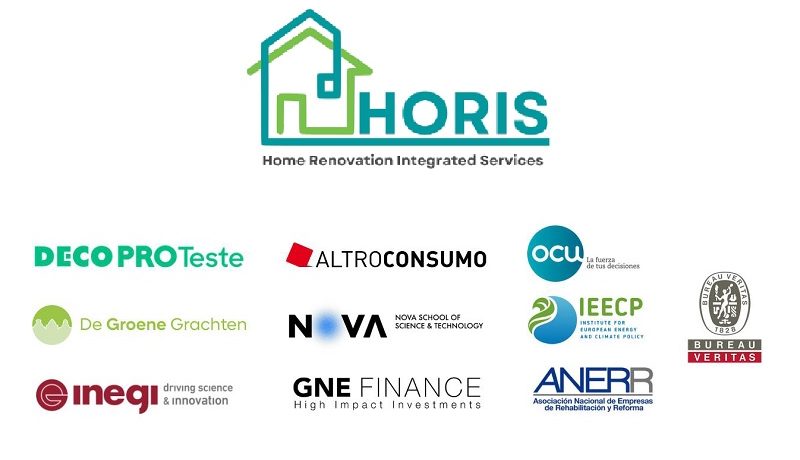Energy-saving decisions for home renovations. 10 organisations join forces to build a digital platform empowering homeowners.
Increasing energy prices have affected millions of Europeans, causing widespread energy poverty to reach rates never seen before.
Consumers facing this situation are in dire need for support to reduce their energy consumption and costs (1), to make informed decisions, increase their knowledge on where and how to start the renovation process and find the right quality-proof professionals. Renovating residential buildings and installing energy efficiency measures can help consumers save energy – as well as Europe achieve its sustainability targets. The HORIS project will lead a people-centric approach to sustainable home renovation and energy efficiency for the next 30 months. 10 organisations from 4 countries (Italy, The Netherlands, Portugal, Spain) will partner to develop a digital platform aiming to simplify the home renovation process and help consumers identify the best options for their needs.
The transition to a low-carbon society requires us to renovate our buildings and make them more energy-efficient. In the European Union, buildings account for 40% of energy consumption and 36% of C02 emissions (2).
An estimated 75% of EU buildings are energy inefficient; implementing energy-saving measures is essential to achieve climate neutrality (3,4).
Due to multiple barriers impacting market deployment, building renovation is happening well below the rate required to reach climate targets.
For the residential sector alone, we need to double the current rate of building upgrades.
Renovating homes will not only reduce collective carbon emissions but help to alleviate energy poverty.
Breaking down barriers to sustainable home renovation
Homeowners face several barriers when deciding on which home renovation measures to take. In the most recent energy transition barometer survey by KfW, 2 in 5 homeowners in Germany say they can’t afford climate-friendly renovations, with cost concerns being the most important investment hurdle cited by homeowners, followed by the assumption that the investment is not worthwhile and by the lack of availability of craftsmen.
These are exactly the barriers HORIS wants to break by developing a digital one-stop-shop that simplifies the home renovation process. The project will empower homeowners in Italy, Spain, and Portugal to make informed decisions in sustainable renovation. The project funded by the EU LIFE programme will address the connected issues of energy efficiency and energy poverty by helping homeowners navigate the complexities of home renovation while speeding up the process. Project partners in 4 countries will further develop an existing digital platform, the Green Menu, and build upon existing tools to provide homeowners with a customised package of renovation solutions. Making homeowners aware of the benefits of home renovation and the financial support available is a central objective of the platform.
1 European Commission. Press release – Summer 2023 Economic Forecast: Easing growth momentum amid declining inflation and robust labour market https://ec.europa.eu/commission/presscorner/detail/en/IP_23_4408
2 Roscini, A.V.; Rapf, O.; Kockat, J. On the Way to a Climate-Neutral Europe: Contributions from the Building Sector to a Strengthened 2030 Climate Target; Buildings Performance Institute Europe (BPIE), 2020.
3 European Commission. A Renovation Wave for Europe—Greening our Buildings, Creating Jobs, Improving Lives; 14.10.2020, COM (2020) 662 Final; European Commission, 2020.
4 Shnapp, S.; Paci, D.; Bertoldi, P. Untapping Multiple Benefits: Hidden Values in Environmental and Building Policies; Joint Research Centre Technical Report (JRC120683), 2020.
HORIS will create a network of approved home renovation practitioners to help homeowners make necessary upgrades. By developing a user-friendly and engaging one-stop shop where they can access customised home renovation packages and connect with renovation practitioners, homeowners can be confident they are making the right choice for their properties.
HORIS will engage and collaborate with homeowners, renovation professionals, local and regional public authorities, and non-profit organisations to maximise the environmental, social, and economic benefits.
– Environmental Benefits: create sustainable communities by reducing energy demand, waste generation, and greenhouse gas emissions.
– Social Benefits: reduce energy poverty by helping consumers make energy saving decisions.
– Economic Benefits: stimulate the local economy and create green jobs.
HORIS project partners include 3 consumer organisations to bring energy-saving measures into the heart of citizens’ homes.
Co-funded by the European Union under project number 101120497. Views and opinions expressed are however those of the author(s) only and do not necessarily reflect those of the European Union or CINEA. Neither the European Union nor the granting authority can be held responsible for them.
– BYinnovation is Media Partner of IEECP

